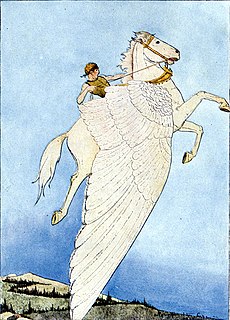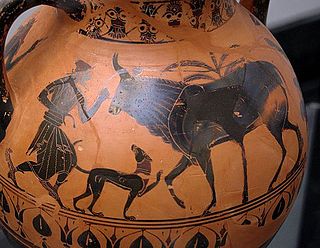Related Research Articles

Hera is the goddess of women, marriage, family, and childbirth in ancient Greek religion and myth, one of the Twelve Olympians and the sister-wife of Zeus. She is the daughter of the Titans Cronus and Rhea. Hera rules over Mount Olympus as queen of the gods. A matronly figure, Hera served as both the patroness and protectress of married women, presiding over weddings and blessing marital unions. One of Hera's defining characteristics is her jealous and vengeful nature against Zeus' numerous lovers and illegitimate offspring, as well as the mortals who cross her.

Pegasus is a mythical winged divine horse, and one of the most recognized creatures in Greek mythology. Usually depicted as pure white, Pegasus is the offspring of the Olympian god Poseidon. He was foaled by the Gorgon Medusa upon her death, when the hero Perseus decapitated her. Pegasus is the brother of Chrysaor and the uncle of Geryon.

Io (; Ancient Greek: Ἰώ [iːɔ̌ː] was, in Greek mythology, one of the mortal lovers of Zeus. An Argive princess, she was an ancestor of many kings and heroes such as Perseus, Cadmus, Heracles, Minos, Lynceus, Cepheus, and Danaus. The astronomer Simon Marius named a moon of Jupiter after Io in 1614.

Semele, in Greek mythology, was the youngest daughter of the Phoenician hero Cadmus and Harmonia, and the mother of Dionysus by Zeus in one of his many origin myths.

In Greek mythology, Inăchus,Inachos or Inakhos was the first king of Argos after whom a river was called Inachus River, the modern Panitsa that drains the western margin of the Argive plain.

Jason and the Argonauts is a 1963 Anglo-American independently made fantasy film produced by Charles H. Schneer and directed by Don Chaffey. Based on Greek mythology, the film stars Todd Armstrong as the eponymous hero, along with Nancy Kovack, Honor Blackman, and Gary Raymond. it was distributed by Columbia Pictures.

Horse-flies or horseflies are true flies in the family Tabanidae in the insect order Diptera. They are often large and agile in flight, and the females bite animals, including humans, to obtain blood. They prefer to fly in sunlight, avoiding dark and shady areas, and are inactive at night. They are found all over the world except for some islands and the polar regions. Both horse-flies and botflies (Oestridae) are sometimes referred to as gadflies.

Zeus is a fictional character, a god appearing in American comic books published by Marvel Comics.

The Dionysiaca is an ancient Greek epic poem and the principal work of Nonnus. It is an epic in 48 books, the longest surviving poem from antiquity at 20,426 lines, composed in Homeric dialect and dactylic hexameters, the main subject of which is the life of Dionysus, his expedition to India, and his triumphant return to the west.

Argus Panoptes (All-seeing) or Argos is a many-eyed giant in Greek mythology. The figure is known for having generated the saying "the eyes of Argus", as in to be "followed by the eyes of Argus", or "trailed by" them, or "watched by" them, etc. These terms are used to describe being subject to strict scrutiny in one's actions to an invasive, distressing degree. The monstrous entity has been either directly included or indirectly alluded to in a wide variety of works influenced by Greco-Roman thought over the past several centuries.
In Greek mythology, Keroessa was a heroine of the foundational myth of Byzantium. She was the daughter of Io and Zeus; elder sister of Epaphus; and mother of Byzas, founder of Byzantium, with her uncle, Poseidon.
Jealousy in religion examines how the scriptures and teachings of various religions deal with the topic of jealousy.
The Olympian Gods are characters based upon Greek mythology who appear primarily in Wonder Woman, Captain Marvel and Aquaman comics.

Hercules and Xena – The Animated Movie: The Battle for Mount Olympus is a 1998 American animated action adventure direct-to-video film starring the voices of Kevin Sorbo, Lucy Lawless, Michael Hurst, Renee O'Connor, Kevin Smith, and Alexandra Tydings, all reprising their roles from Hercules: The Legendary Journeys and Xena: Warrior Princess. It was directed by Lynne Naylor and written by John Loy. It later received a television airing on Fox's Fox Kids block.

Hera is a fictional deity appearing in American comic books published by Marvel Comics. The character is based on the Greek Goddess of the same name. Hera first appeared in the pages of Thor #129, written by Stan Lee and drawn by Jack Kirby.
Mythic Warriors is an animated television series, which featured retellings of popular Greek myths that were altered so as to be appropriate for younger audiences, produced by Nelvana and Marathon Media. Two seasons of episodes were produced in 1998 and 1999; then aired as reruns until 2000, when CBS' abolition of its children's programming resulted in its cancellation. The series was based on the book series Myth Men Guardians of the Legend written in 1996 and 1997 by Laura Geringer and illustrated by Peter Bollinger.

The Io Passion is a chamber opera with music by Harrison Birtwistle and a libretto in English by Stephen Plaice. It was commissioned jointly by the Aldeburgh Festival, Almeida Opera and the Bregenz Festival in Austria.

Bellerophon or Bellerophontes (Βελλεροφόντης) is a hero of Greek mythology. He was "the greatest hero and slayer of monsters, alongside Cadmus and Perseus, before the days of Heracles", and his greatest feat was killing the Chimera, a monster that Homer depicted with a lion's head, a goat's body, and a serpent's tail: "her breath came out in terrible blasts of burning flame."

Zeus is a fictional deity in the DC Comics universe, an interpretation of Zeus from Greek mythology. His appearances are most significant in stories of Wonder Woman. With the 2011 relaunch of DC Comics dubbed The New 52, Zeus has received a prominent role in the Wonder Woman mythos, as he is now the biological father of Wonder Woman through Hippolyta.

Insects have appeared in literature from classical times to the present day, an aspect of their role in culture more generally. Insects represent both positive qualities like cooperation and hard work, and negative ones like greed.
References
- ↑ Felson, Nancy. "Pegasus." World Book Online Reference Center. 2009. [Place of access.] 12 June 2009 http://www.worldbookonline.com/wb/Article?id=ar420080 Archived 2011-06-08 at the Wayback Machine